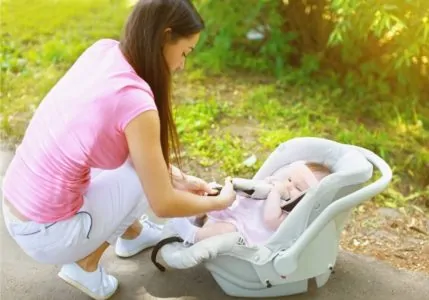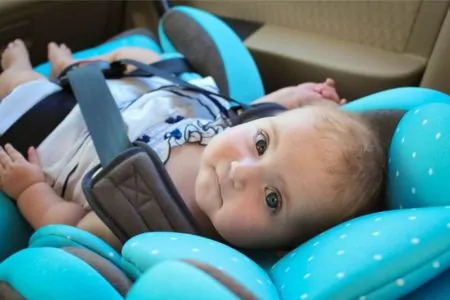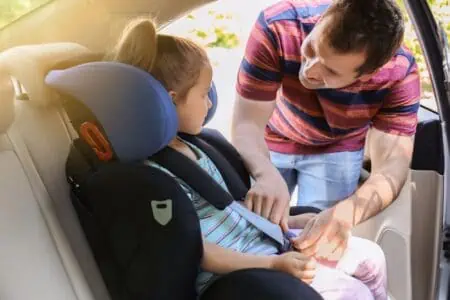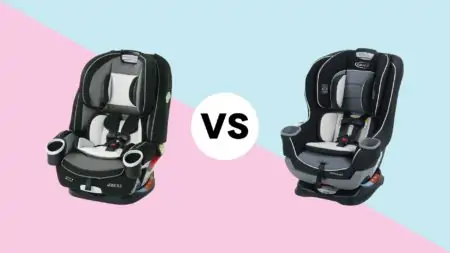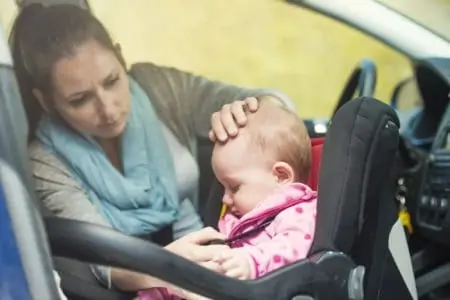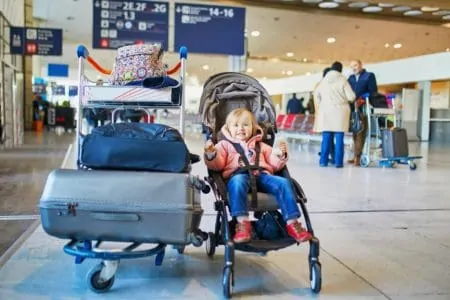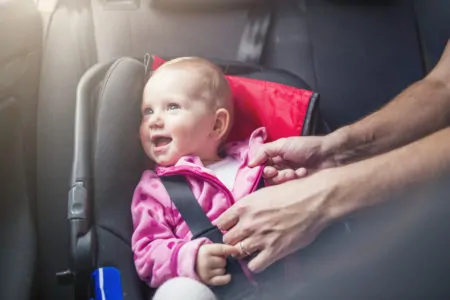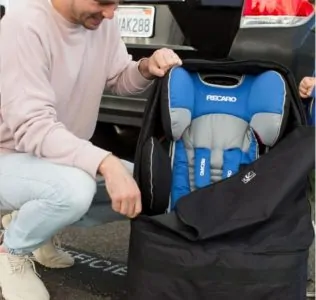We know the burden these costs place on families, and we want to help. We have dug into the resources available to help you find a free or reduced-cost car seat so you can keep your little one safe without breaking the bank.
Key Takeaways
- National organizations help: Groups like Safe Kids Worldwide and Baby2Baby partner with local agencies to distribute seats to families in need.
- Use local resources: Dialing 2-1-1 or contacting your local WIC office are often the fastest ways to find available programs in your specific county.
- Check your insurance: Medicaid and some private insurance providers may cover the cost of a car seat if you meet certain criteria.
- Be wary of used seats: Avoid taking free seats from strangers; if you don’t know the seat’s full history, it isn’t safe to use.
Car Seat Costs
Whether you need an infant seat or a convertible seat, the price tags can be shocking. Generally, you can expect to spend anywhere between $50 and $350 (or more) for a new seat.
For some, a $60 seat is manageable. For many others, the cost of baby needs induces major anxiety.
Here is the good news: Affordable car seats are just as safe as the luxury ones. All car seats sold in the U.S. must meet the same federal safety standards (FMVSS 213). You are paying for extra padding or convenience features with expensive brands, not better crash protection. If you cannot afford even the budget-friendly options, there are programs designed to help.
How to Find Free Car Seats
Most of these organizations work through referrals or local partnerships. They might not hand you a seat directly at their headquarters, but they can connect you with the local agency that does.
These resources are designed for families who genuinely cannot afford a seat. If you have the means to buy a budget seat, please leave these resources for those in critical need.
1. Call “211” (United Way)
This is the best starting point for most parents. Dialing 2-1-1 connects you to a local community resource specialist who can access a database of local services.
Operated by United Way, this service covers all 50 states (1). Instead of calling ten different churches or non-profits, 2-1-1 can tell you exactly which organizations in your zip code currently have car seat programs, food pantries, or rent assistance available.
2. Medicaid and Insurance Providers
While not guaranteed, it is always worth checking your health coverage.
- Medicaid: In many states, Medicaid classifies car seats as a preventative health measure. You may need a prescription from your pediatrician and have to take a short safety course, but the seat itself is often covered.
- Private Insurance: Call the number on the back of your insurance card. Ask if they offer reimbursement or a free car seat for new parents. This is common with plans that offer “maternity management” programs.
3. WIC and Local Health Departments
Government departments catering to women and children are invaluable resources. If you are eligible for the Women, Infants, and Children (WIC) program, ask your caseworker during your next appointment.
Even if the WIC office doesn’t have a stockpile of seats, they usually know exactly which local agency does. The same applies to your local Department of Social Services or Department of Child Services (2).
4. Safe Kids Worldwide
Safe Kids Worldwide is a global organization dedicated to preventing childhood injuries. They have over 400 coalitions across the United States (3).
Many local Safe Kids coalitions run inspection stations where certified Child Passenger Safety Technicians (CPSTs) check installations. These coalitions often receive grants to distribute seats to families in need. You can find and contact your local coalition here to ask about upcoming distribution events.
5. Baby2Baby
Baby2Baby is a national non-profit that provides diapers, clothing, and basic necessities to children living in poverty (4).
They have a network of partner organizations across the country. By finding a partner agency near you, you may be able to access their inventory of donated items, which often includes new car seats.
6. Buckle Up for Life
Created by Toyota and Cincinnati Children’s Hospital, Buckle Up for Life partners with local agencies to provide safety education and free car seats to families in need (5).
Check their website to see if there is a partner agency in your city. You usually have to attend a safety presentation to qualify for the seat, which is a great way to learn how to install it correctly anyway.
7. Hospitals
Hospitals cannot let you leave with a newborn unless you have a properly installed car seat. Because of this, many hospitals have social workers on staff who can help you if you arrive without one.
Some hospitals have grant-funded seats available for patients in financial distress. Others may offer “loaner” programs or sell seats at a significant discount. Ask to speak to a social worker or the discharge planner well before your due date.
8. Police and Fire Departments
Historically, police and fire stations were go-to spots for car seat help. Today, fewer stations offer this service due to liability or budget cuts, but it is still worth a phone call.
Call their non-emergency administrative line (do not call 911). Ask if they have a certified CPST on staff or if they know of local programs distributing seats.
9. Local Non-Profits (e.g., Everyday Miracles)
Smaller, regional non-profits often fill the gaps left by national organizations. For example, Everyday Miracles in Minnesota provides free car seats to residents with qualifying state-funded health plans (6).
Search online for “pregnancy resource center” or “Catholic Charities” followed by your city name to find similar local groups.
The “Almost Free” Option: Trade-In Events
If you can scrape together a small budget, keep an eye out for car seat trade-in events. Major retailers like Target and Walmart typically host these once or twice a year.
You can bring in any old, expired, or damaged car seat (even one you find on a curb) and trade it in for a coupon, usually 20% off a new baby gear item. This can bring the price of a budget-friendly seat down significantly.
The Dangers of Buying Used
You might be tempted to hop onto Facebook Marketplace and grab a free seat from a neighbor. Unless that neighbor is a close friend or family member you trust implicitly, we strongly advise against this.
A stranger’s description of “gently used” isn’t enough proof of safety. A used car seat is a gamble for several reasons:
- Hidden Accident History: Crash damage isn’t always visible to the naked eye. Hairline cracks in the plastic foam can compromise the seat’s ability to protect your child in a future crash.
- Missing Parts: Used seats often lack manuals, registration cards, or specific installation hardware.
- Expiration Dates: Car seats expire. Plastic becomes brittle over time due to heat and UV exposure. You should never use a car seat after the expiration date, which is usually stamped on the plastic shell.
- Recalls: An older seat may have been recalled for safety issues that were never fixed.
Verifying Your Free Seat
If you receive a seat from a charity or organization, do a quick quality check. Most organizations only distribute brand-new seats, but mistakes happen.
- Check the Status: Ensure the seat is new in the box or still has the tags attached.
- Register It: Always fill out the registration card or register online with the manufacturer. This ensures you are notified immediately if there is a safety recall.
- Inspect It: Even with a new seat, give it a once-over. Make sure all straps are present and the buckle clicks securely.
